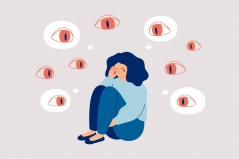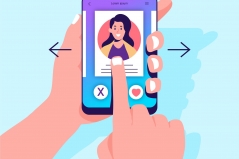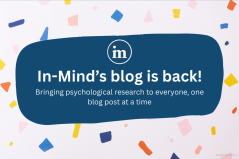Mastering emotions: How emotion regulation can boost your athletic performance

keywords:
Emotion regulation strategies / sport psychology / cognitive reappraisal / visualization / distraction
Mastering emotions: How emotion regulation can boost your athletic performance
Imagine standing on a balance beam. Your heart races, your palms sweat—your body is primed for peak performance. Now comes the crucial decision: how will you steer your emotions?
Will you let the tension paralyze you, or harness it as your driving force?
Emotion regulation doesn’t mean avoiding fear; it means transforming it into focus and confidence. In this article, you’ll discover how targeted emotion regulation techniques can help you unlock your full potential and perform at your best, even under pressure.
/ more
Plant-based, insect-based, or cultivated meat alternatives—Why do we (not) consume them?

keywords:
meat alternatives / alternative protein / vegan / insect / cultivated meat / food choice / influencing factor
Plant-based, insect-based, or cultivated meat alternatives—Why do we (not) consume them?
Meat alternatives have become a fixture on supermarket shelves. While people have been consuming plant-based alternatives for a long time, the consumption of insects and, in the future, cultivated meat faces major challenges. What factors drive people to consume meat alternatives? And why do many people still find it so difficult to replace meat in their diet? Personal values, product perceptions, and social influence play decisive roles in our food choices, especially when it comes to replacing familiar products with alternatives. In this article, we thus examine the psychological factors that promote or hinder the consumption of meat alternatives, as well as the barriers that still need to be overcome. / more
Self-care in the digital age: How we can handle social media in a healthy way

keywords:
social media / mental health / excessive use / self-care / prevention
Self-care in the digital age: How we can handle social media in a healthy way
Do you find it difficult to reduce the time you spend on social media in the long term? Are you interested in learning why you often use social media excessively and what negative effects this can have on you? Here, you'll not only find answers but also practical strategies to protect your mental health, helping you achieve a balanced approach to social media use. / more
Language models: A new perspective on language and cognition

keywords:
language models / cognition / reading
Language models: A new perspective on language and cognition
How do computers help us understand language acquisition? What do ChatGPT and text readability scores have in common? Language models are no longer just a useful technology; they are a window into our own linguistic abilities. Discover how these systems not only generate text but also challenge and deepen insights from the psychology of language. / more
Understanding anxiety, encouraging courage: What families should know about social anxiety

keywords:
Social anxiety / anxiety disorder / psychotherapy / parent training
Understanding anxiety, encouraging courage: What families should know about social anxiety
Social anxiety is among the most common psychological challenges in childhood and adolescence—and it also presents major challenges for parents. How can they support their children without overwhelming them? What role does parental behavior play in the development and maintenance of anxiety? This article introduces the SPACE therapy program—a research-based parent training that shows how mothers and fathers can empathetically support their children in gradually overcoming social anxiety. / more
Learning interdisciplinarity: The solution to societal challenges?

keywords:
Collaboration / learning / Interdisciplinarity / Sustainability / Teamwork
Learning interdisciplinarity: The solution to societal challenges?
Anyone who has worked in a team knows the challenges: differing perspectives often clash. However, what happens when it’s not just opinions that diverge, but entire disciplines? How can we learn to think beyond boundaries and what competencies can help us do so? / more
Starting early: How caregivers can support their children's emotion regulation

keywords:
emotion regulation / child development / parents / caregiver-child interaction / caregiver-environment interaction
Starting early: How caregivers can support their children's emotion regulation
Emotion regulation in children can be challenging: screaming, loud crying, temper tantrums at the supermarket checkout - many people are familiar with such situations. What role do caregivers play in these moments, and how can they effectively support their children? The good news is that even small actions can have a lasting positive effect, strengthening children’s emotion regulation for life. / more
Does emotional labor also exist in sex?

keywords:
Emotional Labor / sexuality / gender roles
Does emotional labor also exist in sex?
Emotional labor refers to suppressing or altering one’s own feelings in order to enhance another person’s well-being. But does sex involve emotional labor? / more
In-Mind has relaunched its blog post
In-Mind has relaunched its blog post
We are excited to announce that the English version of In-Mind has relaunched its blog. The goal of In-Mind’s online blog is to communicate psychological research in a way that is scientifically accurate, accessible, and engaging for a broad readership. Articles span a broad spectrum of topics, with particular emphasis on current social, political, and scientific issues. Blog posts are 300–600 words long, with 1–5 scientific references. Posts summarize the results of an interesting publication, explain... / more
Internet, dating, addiction: A match made in heaven

keywords:
online dating / internet addiction / social media / smartphone addiction / problematic internet use
Internet, dating, addiction: A match made in heaven
Dating apps are said to have turned dating into an addiction. Instead of efficiently connecting people for in-person dates, users may get lost in “binge swiping”. But what makes it so hard to stop swiping – and when does it become a problem? We review existing research and explain what researchers mean by “online dating addiction”, why the science isn’t so simple, and what you can do to resist the pull. / more

